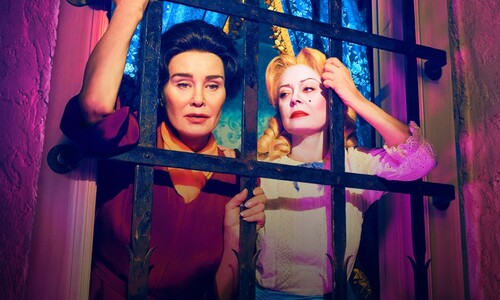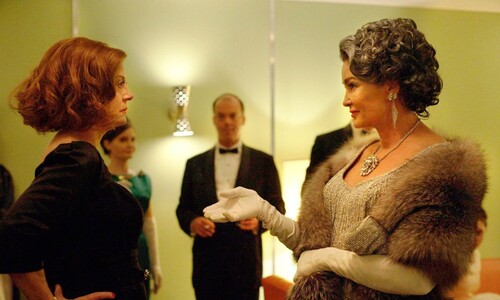¿Crawford or Davis? Oh my god, such a gay dilemma. It took me years to stand up to the dreadful people forcing us to choose and be able to say, "both, dahling, both". So I was feeling so grown up by having, at last, managed to acknowledge both my inner Davis (bitchy, witty, fierce) and my inner Crawford (hard-working, extrovertive, soulful) that the prospect of yet another re-telling of the presumed "feud" between them did not make me salivate exactly.
And boy was I wrong. Being helmed by Ryan Murphy, Feud, about the relationship between the actresses on the occasion of the shooting of Whatever Happened to Baby Jane? and later, as years did their dirty work, is still a very gay affair.
But it is mature gay rather than youthful and dizzy and campy: it shows fascination and respect for both women, and it sympathizes with their plight, it is quietly aware of the dread of old age in Hollywood. It acknowledges, as who would not, that Davis was the better actress and that Crawford did some questionable things (of which she is absolved), but it also gets to the heart of Hollywood in the early sixties and sees them both at the center of a web of circumstances.
Feud is both well informed and very canny in its diagnostic of the whole affair. The Hollywood here is so accurate in spirit, so alive through the performances. The studio system was in decline, the remaining moguls seemed to have lost their touch, some declared the woman's picture dead and Lawrence of Arabia (not even a female camel in sight) was the Oscar Winner and the box office hit, so it seemed that a twist on melodrama was the only way forward for actresses.

And, as the narrative makes clear, it seemed that the kind of publicity resulting from the clash between the two legends might get the attention that good work would not. Both stars were led to believe that. So what you have is wounded, vulnerable performers, exposed to time and with so much at risk.
The story does not end happily, but we know that. Baby Jane is hypnotic and tricky, very watchable indeed, but it was a curse for both. Davis, by excelling at her art, was pigeonholed as a grotesque horror diva. Crawford did not even manage that, she never found another good role and languished into oblivion only to be turned into camp by Faye Dunaway in Mommie Dearest.
The series goes beyond the Baby Jane affair to take in the full complexity of the times. Some moments are very well observed: the gleeful humiliations Jack Warner was fond of, Geraldine Page and Anne Bancroft understanding Crawford's pain, Davis visiting her daughter, the touching conversation at the café about how they both felt about beauty, that moment at the 1978 Academy Awards when Crawford's death only gets two seconds' remembrance, Cukor warning Crawford not to do what she plans to do at the 1963 awards, Olivia de Havilland coming to Davis's rescue and Kathy Bates getting Joan Blondell just right.

And while we talk about the performances, let me say I will never again see Davis without thinking of Sarandon, and although I would not say the same about Crawford and Lange, the truth is she is sublime and her scene in the last episode during her dreams had me in tears.
Of course watching Baby Jane under the influence of the Crawford/ Davis always added to the fascination. It will spoil part of the fun because Ryan Murphy is managing to make some of it so clear, as it spoils the unease, the murky emotions the film keeps for those of us who feel something secret, almost embarrassing about the Hollywood golden age and the star system. Murphy is right. The pain of the characters is the pain of those two actresses.
Feuds are, after all about pain. It is about how Hollywood cynically pretended that one could overcome reality, that emotion could be channeled into a happy ending.
